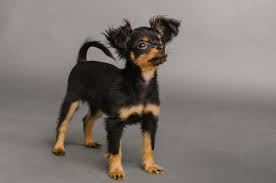
Russkiy Toy
Conditions of detention
Russkiy Toys adapt well to various living conditions, including apartments and houses. They do well in urban environments due to their small size.
Useful Fact: Despite their small size, they are quite active indoors and enjoy short walks and playtime.
Nutrition and diet
A balanced diet suitable for small breeds is essential. High-quality commercial dog food or a well-planned homemade diet can meet their nutritional needs.
Useful Fact: Due to their small size, it’s important to monitor their food intake to prevent obesity and dental issues common in small breeds.
Health
Russkiy Toys are generally healthy but can be prone to certain conditions such as patellar luxation, dental issues, and heart problems.
Useful Fact: Regular veterinary check-ups and good dental hygiene can help prevent common health problems.
Grooming and care
Grooming requirements depend on the coat type. Smooth-haired Russkiy Toys need minimal grooming, while long-haired ones require regular brushing to prevent tangling.
Useful Fact: Regular grooming sessions also provide an opportunity to check for skin issues and ensure their coat stays healthy
Education and training
Russkiy Toys are intelligent and eager to please, making them highly trainable. Early socialization and obedience training are important.
Useful Fact: Positive reinforcement techniques work best, as Russkiy Toys respond well to rewards and gentle guidance.
Toys and entertainment
Interactive toys, puzzle games, and activities that engage their minds and bodies are ideal. They enjoy tasks that mimic their natural instincts, such as fetching small toys.
Useful Fact: Providing a variety of toys can help keep them entertained and prevent boredom-related behaviors.
Safety
Given their small size, Russkiy Toys should be supervised around larger animals and young children to prevent accidental injuries.
Useful Fact: Leash training is crucial for their safety during walks, as they are curious and may dart off unexpectedly.
Accessories
Lightweight collars, leashes, and comfortable bedding are necessary. Given their small size, accessories should be appropriately sized.
Useful Fact: A harness can provide better control during walks and help prevent strain on their delicate necks.
Socialization
Early and consistent socialization with other dogs, animals, and people is important to ensure they grow into well-rounded adults.
Useful Fact: Regular exposure to different environments and positive interactions with other animals can help reduce anxiety and enhance their social skills.
Travel and Transportation
Russkiy Toys are generally good travelers. They need secure arrangements and may enjoy being in a carrier during long trips.
Useful Fact: Training them to be comfortable in a travel carrier can make travel easier and less stressful.
Behavior and psychology
Russkiy Toys are known for their lively, intelligent, and affectionate nature. They are playful and enjoy spending time with their families.
Useful Fact: Understanding their need for mental and physical activity can help in managing their behavior and ensuring a happy, well-adjusted pet.
Legal aspects
Owning a Russkiy Toy may be subject to specific regulations, especially in areas with breed-specific legislation.
Useful Fact: Checking local regulations regarding pet ownership can help ensure compliance and prevent legal issues.


